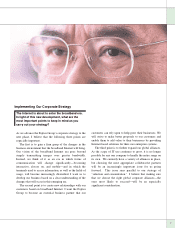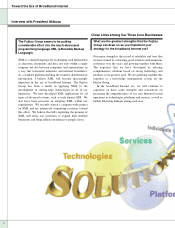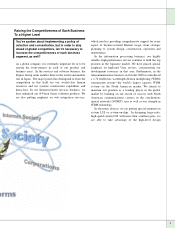Fujitsu 2001 Annual Report Download - page 19
Download and view the complete annual report
Please find page 19 of the 2001 Fujitsu annual report below. You can navigate through the pages in the report by either clicking on the pages listed below, or by using the keyword search tool below to find specific information within the annual report.
17
Local elementary school students benefited from FNC donation made possible
by waste reduction cost savings.
Making All Our Products Green
solutions principally for customers in the manufacturing
industry. With the addition of these new solutions for local
government to our already-announced solutions for
environmental management and environmental assessment,
we now offer total environmental solutions for local
government—from assistance in securing ISO to
environmental information administration systems.
Based on our “Green Product Assessment Standards,” which
we have adopted globally as part of our corporate
environmental policy, we are continuing to pursue
development of environmentally friendly products. Up to
now, we have focused on consumer products, such as
personal computers. Going forward, however, we intend to
apply green standards to all new product development,
including enterprise products such as servers and
telecommunications equipment, and encompassing a total
of 320 product groups by the end of fiscal 2002 (end of
fiscal 2003 for the Fujitsu Group overall). Moreover, we plan
to increase the proportion of green parts procurement (parts
not containing any harmful chemical substances) to over 99%
of the value of total procurement within the same time frame.
Zero Waste Emission Policy Includes Kitchen Garbage
Education, Academic Research and
International Exchange
Based on a global perspective, and in the hope of fostering
the development of the coming generation, Fujitsu has been
actively engaged in supporting a number of educational and
exchange programs.
For example, the Japan-America Institute of Management
Science (JAIMS), which Fujitsu founded in Hawaii in 1972,
brings together business people from all over the world,
with the goal of fostering effective business leaders for the
global age. The Foundation for International Information
Processing (FINIPED), founded by Fujitsu in the same
year, provides funding for students to receive education or
training in information processing at universities in Japan or
overseas, thereby fostering the development of human
resources worldwide in this field.
In 1985, which marked the 50th anniversary of our
establishment, we set up the Fujitsu Asia-Pacific Scholar-
ship Program. The program’s objective is to provide
students and business people from the Asia-Pacific region
with the opportunity to study the respective management
styles and cultures of Japan, the United States and China,
and learn about their different value systems.
among boys and girls—as well as among educators—from
around the world who share a love for mathematics. The
competition has taken place in a different participating
country every year since the first competition was held in
Romania in 1959. Japan has been participating since the
31st competition in China in 1990. Incidentally, Japan was
selected as the site for the 44th competition in 2003, and we
are looking forward to supporting every aspect of the
competition.
In dealing with waste matter at our factories, we are taking
the definition of “zero emissions” one step further by going
beyond industrial waste to include kitchen garbage and other
waste products from daily life. By this strict standard, we
intend to achieve zero emissions at all our plants by the end
of fiscal 2003. Regarding kitchen waste treatment, we are not
content with simply turning it into organic fertilizer. We are
putting the extra effort into sorting and packing in order to
make the kind of high-quality fertilizer that farmers can really
use. What is more, we have achieved a total recycling system,
whereby we supply this fertilizer to organic farmers on a
contractual basis and then purchase the crops grown with it
for use in our employee cafeterias.
FNC Greatly Reduces Chemical and Solid Waste
At its plant in Richardson, Texas, Fujitsu Network
Communications, Inc. (FNC) was able last year to reduce its
emissions of chemical waste matter by 60% and solid waste
by 77%. As a result, the company achieved total cost savings
of over $100,000, which it then donated to local charities.
























